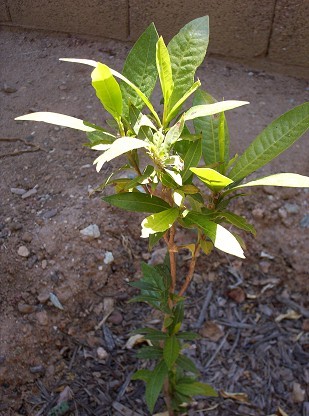|
Unfortunatley, this Lucuma died in September the year this picture was taken.
I gave a moderate dose of chemical fertilizer to a lemon tree that was near it and all of the lucuma's leaves dried up and fell off within days.
I still believe it is a viable plant for the Phoenix area, but one must be very patient and careful with it.
If anyone has a lucuma that produces in the Phoenix area, let me know about it. I'd like to pay you a visit and
write about it. I also might try growing it again in the future. The advice given below in this article is still accurate.
 Photo
Photo
The small Lucuma tree on the right was photographed in late June, and it is about 2 feet tall.
It was planted in early spring of the previous year, and originally grown from seed that came from Peru.
I originally had two of these trees but the first one I planted died when temperatures went
down to 26 F. in January of 2007. The plant was only pencil thin when it froze so perhaps if it had been
larger it would have survived this extraordinary Phoenix weather. Lucumas are from the highlands of Peru and are
theoretically hardy into the mid 20's F.
This lucuma tree is growing on the north side of a 6 foot block wall (4 ft. away) and on the east side
of a large lemon tree at its drip line (4 ft. away), so it receives afternoon shade and protection from hot southern exposure.
This tree has been very slow growing and appears to be very sensitive to being over fertilized. Even fish
emulsion seems to burn it, so I currently give it only water and sprinkle some composted mulch around its base.
Notice that a lucuma trees leaves are shiny and similar to gardenia leaves but thinner, which makes them
a very attractive plant.
Overview
Lucuma trees are native to the highland tropics of the Andes mountains in South America.
The climate in this region is very mild with high temperatures ranging from 60 to 80 degrees
Fahrenheit year round. There are large differences between day and night temperatures in this area,
which can often change as much as 30 degrees F. in one day.
Light frosts do occur but are rare. This region also has a pronounced dry and wet season.
Interestingly, the winter in Phoenix is very similar to the dry season in the lucuma's
home range. Summers on the other hand are quite foreign for it. These similarities and differences make the lucuma
an interesting experiment here. Given the right micro climate lucumas definitely survive
and grow in Phoenix but whether they will produce good fruit is still a mystery.
Fruit
Lucuma fruits are very unusual. They resemble a large green acorn, without the cap, and have a
dry powdery orange flesh on the inside. See the L. Designs link at the bottom of this page for
a picture. The flavor of a fresh lucuma is an acquired taste, but most people find it pleasant
in small amounts. For me it is similar to a tangy pumpkin pie or a candied yam.
Where the lucuma really shines is when it is mixed with milk products, such
as shakes, ice creams, and yogurt. In fact, there is a very large world market for dehydrated
lucuma powder and it is a popular ice cream flavor in Europe.
Heat Tolerance and Sun Exposure
Lucuma trees need afternoon shade in the summer. Even with shade they show signs of heat stress
, such as leaf tip burn,
in particularly hot dry conditions.
Cold Tolerance
Being hardy to the mid 20's F., frost damage should not be much of a concern
in the Phoenix metropolitan area. However, very small lucuma trees can be
killed by temperatures below freezing.
Planting
Dig a hole at least twice the size of the rootball. At a minimum, make the
hole 2 feet in diameter and 2 feet deep.
Work in a 30/70 mix of compost to soil.
Be sure to mix the compost and soil
as thoroughly as possible. It also is a good idea to finish with the
hole an inch or two recessed so that a watering basin is formed.
Watering frequency
Lucumas do well on a grass watering schedule.
Watering method
Basin irrigation
is recommended because it helps keep the salt in our salty
water from accumulating around the roots. Furthermore, deep watering
will encourage the plant to develop deeper roots, making the plant tougher when the weather
gets hot and dry.
Fertilizing and Growth Rate
No nitrogen fertilizers of any kind, chemical or organic, should be applied to this tree because it is slow growing
and very sensitive.
Propagation
Lucumas can be grafted.
Pests
No known pests in Phoenix Arizona.
Links to more lucuma information
Lucuma - Wikipedia
Lucuma / Lucmo - Julia Morton
|
 Book the Phoenix Tropicals Condo on Kiahuna Beach, in Kauai, Hawaii
Book the Phoenix Tropicals Condo on Kiahuna Beach, in Kauai, Hawaii